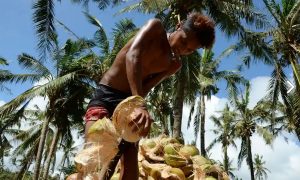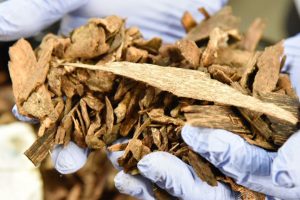PHL working to address US fears about coconut oil health impact

By Justine Irish D. Tabile, Reporter
THE Department of Trade and Industry (DTI) said it may propose a joint study with the US to follow up on lingering fears about coconut products even after the withdrawal of US health warnings against coconut oil as a saturated fat.
Export Marketing Bureau Executive Director Bianca Pearl R. Sykimte said issues continue to cast doubts about coconut despite the US Food and Drug Administration’s (FDA) removal of coconut from the list of tree nuts classified as major food allergens.
“For the US (we had) the health warnings against coconut oil as saturated fat, and for the European Union (EU) , we have the forthcoming EU regulation on mineral oil saturated hydrocarbons and mineral oil aromatic hydrocarbons limits on Food,” she said via Viber.
She said the US and the Philippines vary in their approaches to gauging the health effects of coconut oil.
“It seems that American and Philippine doctors are looking at different parameters to gauge the health effects of consuming coconut oil,” she said.
To address this, she said the Philippines proposed a joint study on the health effects of consuming coconut oil.
The US is the largest export destination for Philippine coconut food-based products. It accounted for $556.29 million, or 25.68% of all exports, in the first 11 months of 2024, the Export Marketing Bureau reported.
The first 11 months’ coconut product exports were up 65% from a year earlier.
According to Ms. Sykimte, the DTI is expecting coconut exports to the US to grow further.
The removal of the FDA designation “will give both consumers and producers more confidence in using or consuming coconut or coconut-based products, especially for consumers who have nut allergies,” she said.
“We had an experience where we were promoting coconut in the US. There were a lot of inquiries, especially from producers of gluten-free and allergen-free products, but they didn’t follow through when they learned that the US FDA considers coconut a tree nut. (A joint study) will really have a commercial impact,” she added.
United Coconut Associations of the Philippines (UCAP) Executive Director Yvonne T.V. Agustin said that the US removal of the allergen tag on coconut is a positive development for the industry.
“This will positively impact our coconut food product exports. To consumers, manufacturers, and end users of coconut, this will ensure that including coconut as an ingredient in food formulations is safe and will not cause an allergy,” she said in a Viber message.
Charles R. Avila, president of the Confederation of Coconut Farmers’ Organizations of the Philippines, said that the declaration’s immediate impact on individual consumers should not be underestimated.
“So many of them have habitually assumed that avoiding coconut is another way of avoiding carcinogenic food products. This news, then, is welcome to coconut producers. It’s certainly a case of ‘better late than never,’” he said via Viber.
In the late 1980s, he said that coconut was under attack due to lobbying from vegetable oil producers.
“The truth ultimately triumphed in the US Senate, which rejected the proposed labeling law that would have universally carried the insidious caveat that coconut is bad for the heart,” he said.
“But massive propaganda against coconut, which was the exact opposite of the truth, prevailed in the minds of so many consumers,” he added.
To address this, he said that the coconut industry must find ways to advertise coconut again and to erode the carcinogenic perception of coconut.
“Otherwise, it would be tragic for consumers who otherwise could be helped in their health concerns by medicinal and healthful coconut products, and for the millions of coconut farmers and traders who otherwise would be able to sell more in the global market,” he added.




